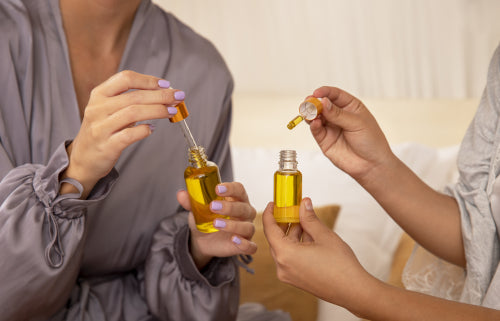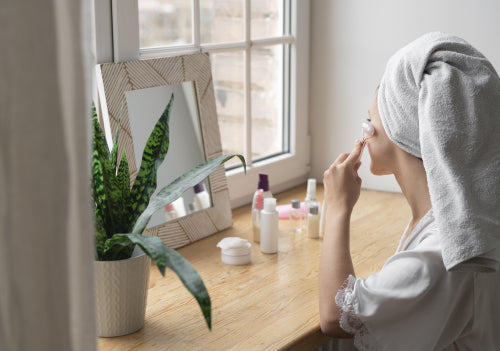The Role of Essential Oils in Skincare: Benefits and Precautions

Quick Listen:
Essential oils have long been valued for their healing properties and aromatic qualities. Derived from plants through processes such as distillation or cold-pressing, these concentrated plant extracts have become increasingly popular in skincare routines. Essential oils are known for their ability to improve skin health, providing a variety of benefits, from hydration to anti-aging effects. However, as with any potent substance, they must be used with caution to avoid skin irritation or allergic reactions. In this blog, we will explore how essential oils can benefit the skin and emphasize the importance of proper usage to ensure safety and effectiveness.
The Benefits of Essential Oils in Skincare
- Hydration
Many essential oils are known for their ability to hydrate and moisturize the skin. For example, oils like lavender, chamomile, and rose oil are particularly beneficial for dry or sensitive skin. They help to lock in moisture, providing nourishment and preventing water loss. When used in combination with a carrier oil like jojoba or argan oil, they can provide a non-greasy, long-lasting hydration solution.
How they work: These oils contain compounds that penetrate the skins surface to deliver deep hydration. They help to restore the skins natural barrier function, allowing it to retain moisture more effectively. As a result, the skin looks plump, healthy, and smooth.
- Anti-Aging Properties
One of the most sought-after benefits of essential oils in skincare is their anti-aging properties. Essential oils such as frankincense, rose, and geranium have powerful antioxidant properties that can help combat the visible signs of aging, including fine lines, wrinkles, and sagging skin.
How they work: Essential oils like frankincense and rose contain compounds that stimulate collagen production and improve skin elasticity. This leads to firmer, more youthful-looking skin. Additionally, antioxidants in essential oils help neutralize free radicalsunstable molecules that contribute to skin aging and damage caused by environmental factors such as UV rays and pollution.
- Soothing and Calming Effects
Essential oils like lavender, chamomile, and sandalwood are renowned for their calming properties. These oils are excellent choices for individuals with sensitive or irritated skin, as they can reduce redness, inflammation, and swelling. They also promote relaxation, making them a great addition to nighttime skincare routines.
How they work: Many essential oils contain anti-inflammatory compounds that can soothe and calm irritated skin. For example, lavender essential oil is often used to reduce redness and swelling associated with conditions like acne or rosacea. Similarly, chamomile oil can help alleviate skin irritation and calm conditions like eczema or dermatitis.
- Antibacterial and Antifungal Properties
Some essential oils, like tea tree oil, eucalyptus, and thyme oil, possess antibacterial, antifungal, and antiseptic properties that can be highly beneficial for acne-prone skin or conditions like fungal infections. These oils can help cleanse the skin, eliminate harmful bacteria, and reduce the occurrence of breakouts.
How they work: The antimicrobial properties of these essential oils help prevent the growth of harmful bacteria on the skin. Tea tree oil, for example, is known for its ability to target the bacteria responsible for acne, making it a popular ingredient in acne-fighting skincare products. Similarly, eucalyptus oil has been shown to help combat fungal infections such as athletes foot and ringworm.
- Brightening and Even Skin Tone
Certain essential oils can help brighten the complexion and even out skin tone. Oils like lemon, orange, and neroli are packed with vitamin C and other antioxidants that promote a healthy, radiant glow.
How they work: Essential oils that contain vitamin C and other brightening agents help to reduce hyperpigmentation and dark spots. Lemon essential oil, for example, is known to have skin-brightening effects due to its ability to exfoliate the skin and promote cell turnover. Regular use of these oils can lead to a more even and luminous skin tone.
Precautions and Safe Usage of Essential Oils in Skincare
While essential oils offer numerous benefits for the skin, they must be used with caution to avoid potential side effects. The potency of essential oils means that improper use can cause skin irritation, allergic reactions, or other adverse effects. It is important to follow guidelines for safe application.
- Dilution is Key
Essential oils are highly concentrated, which means they can cause skin irritation or sensitivity if used undiluted. It is crucial to always dilute essential oils with a carrier oil (such as jojoba oil, coconut oil, or sweet almond oil) before applying them to the skin. A general rule of thumb is to use 1-2 drops of essential oil per teaspoon of carrier oil.
Why dilution matters: Essential oils are potent, and applying them directly to the skin without dilution can lead to irritation, redness, or even chemical burns in some cases. By diluting essential oils, you reduce the risk of adverse reactions and ensure a safe, effective experience.
- Patch Testing is Essential
Before using any essential oil on your face or body, its crucial to perform a patch test. This involves applying a small amount of diluted essential oil to a discreet area of skin (such as the inside of your wrist or elbow) and waiting 24-48 hours to check for any signs of irritation or allergic reaction.
Why patch testing is important: Even though essential oils are natural, they can still cause allergic reactions or skin sensitivity in some individuals. A patch test allows you to determine whether a particular oil is safe for your skin and can help you avoid a potentially unpleasant reaction.
- Know Your Skin Type
Different skin types may react differently to essential oils. For example, individuals with oily or acne-prone skin may benefit from oils like tea tree or lavender, which have antibacterial properties. On the other hand, those with dry or sensitive skin may prefer oils like chamomile or rose for their soothing and moisturizing benefits.
Tailoring your oils to your skin type: Its important to consider your skins needs and sensitivities when selecting essential oils. If you have sensitive or reactive skin, it may be best to start with gentler oils, such as lavender or chamomile, and gradually work your way up to more potent oils.
- Avoid Direct Contact with Eyes and Mucous Membranes
Essential oils should never be applied directly to sensitive areas such as the eyes, nose, or mucous membranes. These areas are more prone to irritation, and the concentrated nature of essential oils can cause discomfort or damage.
How to apply safely: When using essential oils around the face, avoid the delicate eye area. If you accidentally get an essential oil in your eyes, rinse immediately with a carrier oil (not water, which may worsen the irritation) and seek medical advice if necessary.
- Consult a Healthcare Professional
If you are pregnant, breastfeeding, or have any pre-existing medical conditions (such as eczema or asthma), its always wise to consult a healthcare professional before using essential oils. Some essential oils may not be safe during pregnancy or may interact with medications, so its important to check with a doctor to ensure safety.
Medical advice is crucial: Certain essential oils, like rosemary or clary sage, may have contraindications for individuals with certain conditions. Always err on the side of caution and seek professional guidance if you have concerns.
Safe and Effective Skincare with Essential Oils
Essential oils are a powerful addition to any skincare routine, offering a wide range of benefits including hydration, anti-aging, and soothing effects. By selecting the right essential oils for your skin type and needs, you can enjoy healthier, more radiant skin. However, its important to follow safe usage practices, including diluting oils, performing patch tests, and avoiding direct contact with sensitive areas.
When used properly, essential oils can be a valuable tool in achieving your skincare goals. By understanding both the benefits and potential risks, you can incorporate these potent plant extracts into your skincare regimen in a safe and effective way. Remember, a little goes a long way, and with the right knowledge and precautions, essential oils can enhance your skincare routine, leaving your skin feeling rejuvenated and glowing.
You may also be interested in: Stellar Daily Serum Desavery
Tired of putting harsh chemicals and synthetic ingredients in your skin? Discover the gentle, plant-powered, and cruelty-free skincare routine from Desavery. Meticulously crafted for every skin type, our day-and-night formulas nourish and revitalize, giving your skin a healthy, radiant glow. Join the community of those whove found a natural, effective solution for their skincare needs. Let your glowy skin tell a story of health and natural beauty. Shop Desavery Now!
Powered by flareAI



